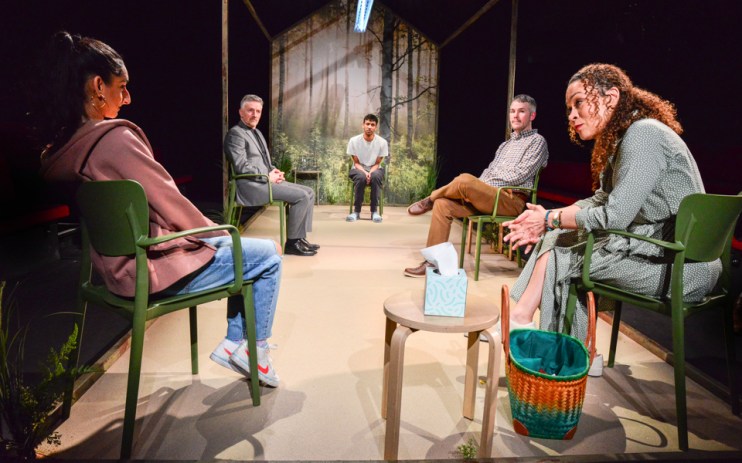Animal Kingdom at Hampstead Theatre is theatre as therapy

The intimate Hampstead Downstairs is just the setting for the emerging playwright to display their wares – all the more so when the work in question introduces its audience to the very private, innermost space of a family therapy session.
From the other side of an imaginary two-way mirror, the audience observes an exposed, unadorned room set up with five chairs, ready to seat their (mostly unwilling) occupants. In the opening scene, we meet Sam, a struggling 21-year-old staying in an inpatient clinic following a suicide attempt, and his therapist, Daniel. Joined by his estranged parents and younger sister Sofia, the audience become privy to 90 minutes of intense therapy among family members who are so emotionally remote from one another that they may as well belong to different species.
Much like the set, direction by Lucy Morrison lacks fuss. The actors sit in a circle, rotating positions between sessions such that the audience is afforded a fair share of face time with each; however, when every line contains such charge, it is frustrating when one has his or her back to you. In this low-key production, the cast
has no place to hide, and whilst I yearned to feel as though I was watching raw, natural dialogue unfurl, some performances were more convincing than others, such that I felt conscious of its basis in script.
This script, though, written by the up-and-coming Ruby Thomas, is smart, spilling over with feeling. Sam’s character is animal-obsessed and the eponymous metaphor at the play’s core serves a myriad of purposes: from reflecting feelings of enclosure, to showing the wild differences between us as humans, as well as meditating on how people become who they are, whether by nature or nurture. Still, what ought to be a nuanced analogy does occasionally feel overplayed in an otherwise clean and unembellished piece of theatre.
This is hard-hitting stuff, imagined with tact and heart. Angsty and unexpectedly funny, this play is about one family, but all families, too. Thomas’ work demonstrates how each of us has a past that impacts on our present, and that the future is unknown, though it contains glimmers of hope. As society’s conversation about mental health becomes increasingly open, Thomas’ narrative and its depiction doesn’t tread any new ground, yet the act of observing the inner lives of others is enthralling nonetheless.
